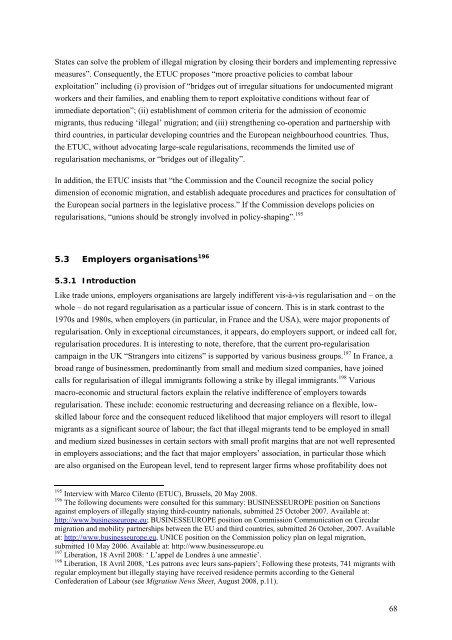REGINE Regularisations in Europe Final Report - European ...
REGINE Regularisations in Europe Final Report - European ...
REGINE Regularisations in Europe Final Report - European ...
You also want an ePaper? Increase the reach of your titles
YUMPU automatically turns print PDFs into web optimized ePapers that Google loves.
States can solve the problem of illegal migration by clos<strong>in</strong>g their borders and implement<strong>in</strong>g repressive<br />
measures”. Consequently, the ETUC proposes “more proactive policies to combat labour<br />
exploitation” <strong>in</strong>clud<strong>in</strong>g (i) provision of “bridges out of irregular situations for undocumented migrant<br />
workers and their families, and enabl<strong>in</strong>g them to report exploitative conditions without fear of<br />
immediate deportation”; (ii) establishment of common criteria for the admission of economic<br />
migrants, thus reduc<strong>in</strong>g ‘illegal’ migration; and (iii) strengthen<strong>in</strong>g co-operation and partnership with<br />
third countries, <strong>in</strong> particular develop<strong>in</strong>g countries and the <strong>Europe</strong>an neighbourhood countries. Thus,<br />
the ETUC, without advocat<strong>in</strong>g large-scale regularisations, recommends the limited use of<br />
regularisation mechanisms, or “bridges out of illegality”.<br />
In addition, the ETUC <strong>in</strong>sists that “the Commission and the Council recognize the social policy<br />
dimension of economic migration, and establish adequate procedures and practices for consultation of<br />
the <strong>Europe</strong>an social partners <strong>in</strong> the legislative process.” If the Commission develops policies on<br />
regularisations, “unions should be strongly <strong>in</strong>volved <strong>in</strong> policy-shap<strong>in</strong>g”. 195<br />
5.3 Employers organisations 196<br />
5.3.1 Introduction<br />
Like trade unions, employers organisations are largely <strong>in</strong>different vis-à-vis regularisation and – on the<br />
whole – do not regard regularisation as a particular issue of concern. This is <strong>in</strong> stark contrast to the<br />
1970s and 1980s, when employers (<strong>in</strong> particular, <strong>in</strong> France and the USA), were major proponents of<br />
regularisation. Only <strong>in</strong> exceptional circumstances, it appears, do employers support, or <strong>in</strong>deed call for,<br />
regularisation procedures. It is <strong>in</strong>terest<strong>in</strong>g to note, therefore, that the current pro-regularisation<br />
campaign <strong>in</strong> the UK “Strangers <strong>in</strong>to citizens” is supported by various bus<strong>in</strong>ess groups. 197 In France, a<br />
broad range of bus<strong>in</strong>essmen, predom<strong>in</strong>antly from small and medium sized companies, have jo<strong>in</strong>ed<br />
calls for regularisation of illegal immigrants follow<strong>in</strong>g a strike by illegal immigrants. 198 Various<br />
macro-economic and structural factors expla<strong>in</strong> the relative <strong>in</strong>difference of employers towards<br />
regularisation. These <strong>in</strong>clude: economic restructur<strong>in</strong>g and decreas<strong>in</strong>g reliance on a flexible, lowskilled<br />
labour force and the consequent reduced likelihood that major employers will resort to illegal<br />
migrants as a significant source of labour; the fact that illegal migrants tend to be employed <strong>in</strong> small<br />
and medium sized bus<strong>in</strong>esses <strong>in</strong> certa<strong>in</strong> sectors with small profit marg<strong>in</strong>s that are not well represented<br />
<strong>in</strong> employers associations; and the fact that major employers’ association, <strong>in</strong> particular those which<br />
are also organised on the <strong>Europe</strong>an level, tend to represent larger firms whose profitability does not<br />
195 Interview with Marco Cilento (ETUC), Brussels, 20 May 2008.<br />
196 The follow<strong>in</strong>g documents were consulted for this summary: BUSINESSEUROPE position on Sanctions<br />
aga<strong>in</strong>st employers of illegally stay<strong>in</strong>g third-country nationals, submitted 25 October 2007. Available at:<br />
http://www.bus<strong>in</strong>esseurope.eu; BUSINESSEUROPE position on Commission Communication on Circular<br />
migration and mobility partnerships between the EU and third countries, submitted 26 October, 2007. Available<br />
at: http://www.bus<strong>in</strong>esseurope.eu, UNICE position on the Commission policy plan on legal migration,<br />
submitted 10 May 2006. Available at: http://www.bus<strong>in</strong>esseurope.eu<br />
197 Liberation, 18 Avril 2008: ‘ L’appel de Londres à une amnestie’.<br />
198 Liberation, 18 Avril 2008, ‘Les patrons avec leurs sans-papiers’; Follow<strong>in</strong>g these protests, 741 migrants with<br />
regular employment but illegally stay<strong>in</strong>g have received residence permits accord<strong>in</strong>g to the General<br />
Confederation of Labour (see Migration News Sheet, August 2008, p.11).<br />
68
















